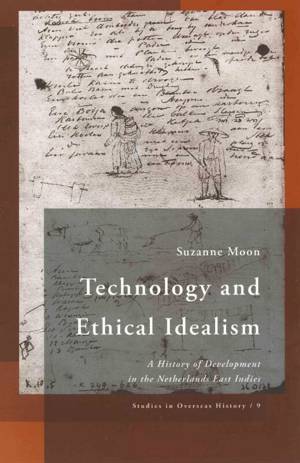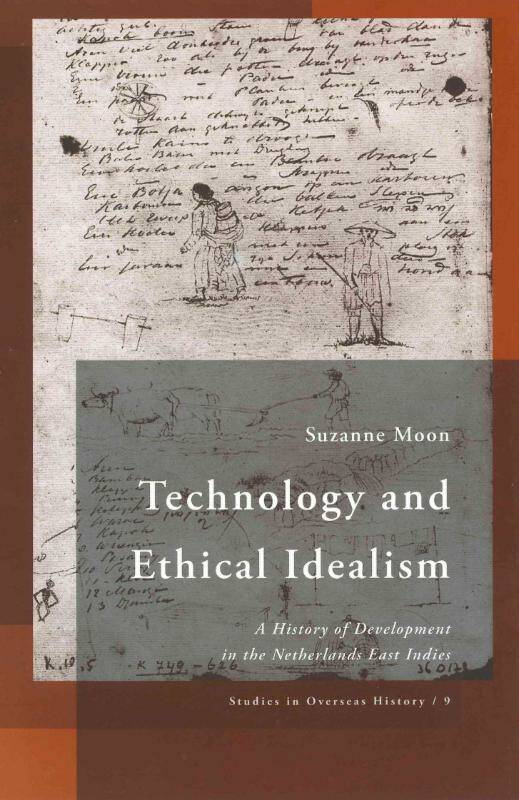
Door een staking bij bpost kan je online bestelling op dit moment iets langer onderweg zijn dan voorzien. Dringend iets nodig? Onze winkels ontvangen jou met open armen!
- Afhalen na 1 uur in een winkel met voorraad
- Gratis thuislevering in België vanaf € 30
- Ruim aanbod met 7 miljoen producten
Door een staking bij bpost kan je online bestelling op dit moment iets langer onderweg zijn dan voorzien. Dringend iets nodig? Onze winkels ontvangen jou met open armen!
- Afhalen na 1 uur in een winkel met voorraad
- Gratis thuislevering in België vanaf € 30
- Ruim aanbod met 7 miljoen producten
Zoeken
€ 39,95
+ 79 punten
Omschrijving
Technology and Ethical Idealism investigates a pivotal intellectual and political moment in twentieth-century Indonesian history, the establishment of “development” as both an ideal and a practice. The focus of this study is on technological development as a central concern of colonial political life from 1900 to 1942 in the Netherlands East Indies. The foundations of developmentalist thinking and practice in the turn-of-the-century colonial reforms were called the Ethical policies. Tracing the interplay of Ethical politics at the highest levels of the Netherlands Indies colonial government with the technical practices of development taking place in the fields of ordinary Javanese farmers, it shows how and why technological development became such an enduring part of political and material life in the archipelago.
This study offers a new history of the Ethical policies that focuses on their often-neglected technopolitical character, and the formative influence they exercised on development thinking in Indonesia among both Dutch experts and members of the community of Indonesian activists known as the pergerakan. In startling contrast with many histories of development, it shows how the interaction of colonial idealism and scientific practice led the Dutch to commit to small-scale change in their “development of the native peoples.” As experts tailored technical solutions to ecological, social, and economic conditions of local areas, they eschewed high modernism in their search for colonial moderni-zation, unexpectedly prefiguring the appropriate technology movements that arose decades later. Based on extensive research in the colonial archives in The Hague, the National Library in Jakarta, and the Bogor Library of Biology and Agriculture, this study draws on official documents and scientific research of the era, as well as public discussions in both Dutch and Indonesian language newspapers and journals in order to capture not just the official plans, but also a wide range of public critiques and responses to development, and the day-to-day practices that shaped the productive lives of ordinary farmers. Offering a new exploration of politics and technology in colonial Indonesia, this book will interest historians of Indonesia and Southeast Asia, historians of technology, and those seeking to understand the complex colonial roots of international development.
Suzanne Moon is an Assistant Professor in the History of Science at the University of Oklahoma. She received her Ph.D. in Science and Technology Studies from Cornell University, where she also studied in the Southeast Asia Program.
This study offers a new history of the Ethical policies that focuses on their often-neglected technopolitical character, and the formative influence they exercised on development thinking in Indonesia among both Dutch experts and members of the community of Indonesian activists known as the pergerakan. In startling contrast with many histories of development, it shows how the interaction of colonial idealism and scientific practice led the Dutch to commit to small-scale change in their “development of the native peoples.” As experts tailored technical solutions to ecological, social, and economic conditions of local areas, they eschewed high modernism in their search for colonial moderni-zation, unexpectedly prefiguring the appropriate technology movements that arose decades later. Based on extensive research in the colonial archives in The Hague, the National Library in Jakarta, and the Bogor Library of Biology and Agriculture, this study draws on official documents and scientific research of the era, as well as public discussions in both Dutch and Indonesian language newspapers and journals in order to capture not just the official plans, but also a wide range of public critiques and responses to development, and the day-to-day practices that shaped the productive lives of ordinary farmers. Offering a new exploration of politics and technology in colonial Indonesia, this book will interest historians of Indonesia and Southeast Asia, historians of technology, and those seeking to understand the complex colonial roots of international development.
Suzanne Moon is an Assistant Professor in the History of Science at the University of Oklahoma. She received her Ph.D. in Science and Technology Studies from Cornell University, where she also studied in the Southeast Asia Program.
Specificaties
Betrokkenen
- Auteur(s):
- Uitgeverij:
Inhoud
- Aantal bladzijden:
- 192
- Taal:
- Engels
- Reeks:
- Reeksnummer:
- nr. 156
Eigenschappen
- Productcode (EAN):
- 9789057891564
- Verschijningsdatum:
- 10/12/2007
- Uitvoering:
- Paperback
- Afmetingen:
- 163 mm x 241 mm
- Gewicht:
- 416 g

Alleen bij Standaard Boekhandel
+ 79 punten op je klantenkaart van Standaard Boekhandel
Beoordelingen
We publiceren alleen reviews die voldoen aan de voorwaarden voor reviews. Bekijk onze voorwaarden voor reviews.











